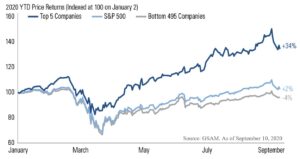The Summer of 2020 turned out to be one Whale of a Tale. Many noticed the precipitous rise in the equity markets over the summer. Certainly, the rebound from the March lows was most profound, but the second leg up from late June was of particular note. The often-ignored trading data revealed odd patterns and high volume which culminated in a market correction in early September. It was then revealed that a “NASDAQ Whale” had been making stock bets.
A “Whale” in investment parlance is a market participant that is making trading waves large enough to affect the whole market. Often the Whale is ambiguous with masked trades. Well, the Whale was recently revealed to be Softbank, a Japanese conglomerate holding company controlled by Masayoshi Son. In effect, Softbank is Masayoshi’s investment vehicle, which includes stock bets.
Softbank started as a software distributor and publisher of technology periodicals which ultimately morphed into a holding company of numerous businesses and stock holdings with a penchant for aggressive, speculative investing. This is similar to Warren Buffett’s use of Berkshire Hathaway, yet with a more tempered approach. Softbank is no small company, valued around $120 Billion.
Through the summer, Softbank (really, Masayosi Son) bought $4 Billion of derivative stock options which controlled $50 Billion of stock value (mostly the top names we’ve been hearing about all summer; Apple, Amazon, Microsoft, etc.). The options were effectively bets that the stocks would go up. The firms that sold Softbank the options had to hedge themselves by actually buying the underlying stock… which drove up the stock prices. Simply, Softbank bet on rising stock prices while creating the environment to drive stock prices higher.

To outsiders, all we see is an appreciating stock market with the media talking heads guessing why the rise is taking place. Yet, behind the scenes, it was a choreographed dance by one person. The ramifications could have been worse than a run of the mill market correction.
What can be learned from all of this?
In one word, diversification. No matter how well an individual knows a company, its financials or its business environment, there is always a trader(s) or investor(s) somewhere around the global that is playing a different game. The best defense to nefarious intentions is portfolio diversification to absorb the unforeseen shocks.
CRN-3245370-091720


Recent Comments